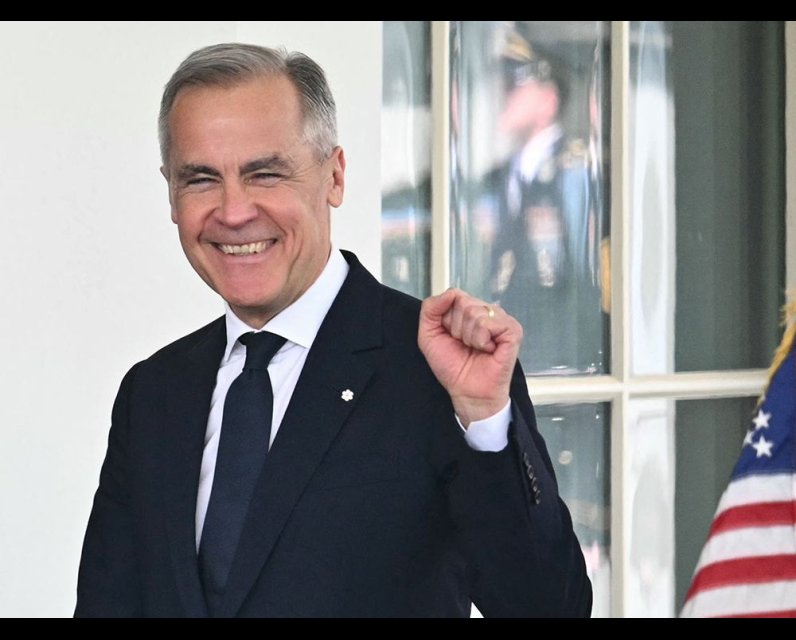Americans still view Canada as good trading partner, despite Trump's rhetoric: new poll

Most Americans still see Canada as a solid trading partner and Prime Minister Mark Carney as a respected leader despite the ongoing trade war, a new Leger poll has found.
Two thirds of Americans (66 per cent) view Canada as either a good (39 per cent) or very good (27 per cent) partner for trade with the United States, while just nine per cent see Canada as a bad (seven per cent) or very bad (two per cent) partner.
“If I were the Canadian government,” Andrew Enns, the executive vice-president at Leger, told National Post, “I’d go, okay, it’s not a bad place to be when, at some point, we got some heavy lifting to do with the U.S. government on some big issues.”
A respondent’s political affiliation influenced their views. While 80 per cent of Democrats see Canada as a good (34 per cent) or very good (45 per cent) trading partner, only 64 per cent of Republicans feel the same (49 per cent said “good” and 15 per cent said “very good”). Just three per cent of Democrats see Canada as a bad or very bad trading partner, while 17 per cent of Republicans do.
“I suspect Republicans are taking their cues from President (Donald) Trump and probably recalling some of the things that President Trump has said, that we’re not as nice as we come across,” Enns said. “If you’re a (Canadian) government official, and you’re down in a meeting with people in Washington, in the administration, when you meet with Democrats, you’re probably going to have a friendlier meeting compared to when you meet with Republicans.”
Tensions between the United States and Canada have escalated since President Trump returned to the White House in January and proceeded to repeatedly call then-prime minister Justin Trudeau a governor and refer to Canada as the 51st state. Trump has also imposed tariffs on Canadian exports and said the northern border is porous and exploited by drug traffickers.
Despite the ongoing tensions, Prime Minister Carney came ahead of other political leaders surveyed, with 33 per cent of Americans having a favourable opinion of him, ahead of French President Emmanuel Macron (30 per cent), Mexican President Claudia Sheinbaum and British Prime Minister Keir Starmer (both with 29 per cent), the leaders of Germany and Japan, both with 27 per cent, and Israeli Prime Minister Benjamin Netanyahu (26 per cent). China’s Xi Jinping (12 per cent) and Russia’s Vladimir Putin (10 per cent) came last.
“I was a bit surprised by Mr. Carney’s personal rating,” Enns said. “Interestingly, in relation to other leaders, he comes across as actually quite good. Tops the list.”
Americans view Carney in a noticeably better light than former prime minister Justin Trudeau. The last Leger study gauging American attitudes, which was taken back in January, less than two months before Trudeau left office, revealed less than a quarter (24 per cent) had a favourable opinion of him.
Americans named Great Britain (17 per cent) and Israel (14 per cent) as their country’s foremost allies, ahead of Canada (12 per cent), which Enns said shows the difference between the popularity of political leaders versus nations themselves. Enns said Canada’s ranking outside the top two was a point which should trigger some thought among federal leaders in Ottawa.
“I’d look at this question and go, I’m not sure I’m super happy that we’re suddenly third place behind Great Britain and Israel in terms of being perceived by the American public as being a good friend and ally,” Enns said. “We shared the longest undefended border for quite a long time without any issues.”
Russia came in fourth with just four per cent, followed by Japan and Mexico (both with three per cent). However, large shares answered “none” (18 per cent) or “don’t know” (24 per cent).
Enns encouraged Carney to leverage his favourability “to speak directly to Americans” to convey that Canada has “been a really good trading partner.”
The poll also found that less than half (39 per cent) of Americans have a favourable view of Trump, while 48 per cent have an unfavourable view.
The online poll of 1,014 Americans was conducted between Aug. 29 and Aug. 31, 2025. A margin of error cannot be associated with a non-probability sample in a panel survey for comparison purposes. A probability sample would have a margin of error of plus or minus 3.1 per cent, 19 times out of 20.
Our website is the place for the latest breaking news, exclusive scoops, longreads and provocative commentary. Please bookmark nationalpost.com and sign up for our politics newsletter, First Reading, here.

Comments
Be the first to comment